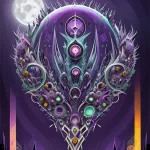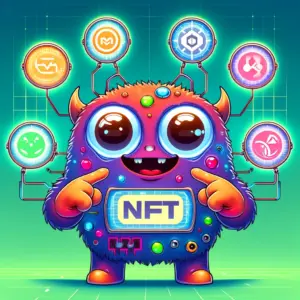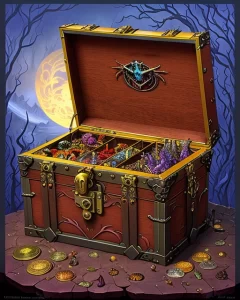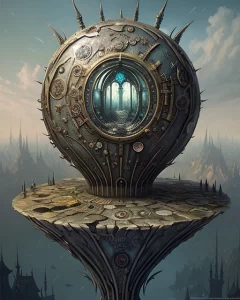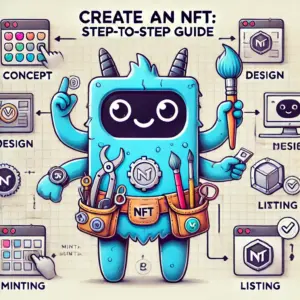The digital age has ushered in a new era of collecting and ownership. Gone are the days of dusty attics filled with priceless paintings or overflowing shelves crammed with rare first editions. Today, the hottest commodities reside on our screens, taking the form of Non-Fungible Tokens, or NFTs. But what exactly are these digital darlings, and why are they causing such a stir? This comprehensive guide delves into the world of NFTs, answering 30 essential questions to equip you with all the knowledge you need.
Table of Contents:
Unveiling the Basics (Q1-Q10)
- What are NFTs? In essence, NFTs are digital certificates of ownership for unique virtual assets. Think of them as digital deeds stored on a special blockchain ledger, verifying your claim to a one-of-a-kind digital item. This could be anything from artwork and music to in-game items and virtual real estate.
- What makes them “non-fungible”? Unlike traditional currencies (fungible), where one Bitcoin is identical to another, each NFT is unique and irreplaceable. This scarcity is a key factor driving their value.
- How do NFTs work? NFTs are built upon blockchain technology, the same system that powers cryptocurrencies like Bitcoin. This distributed ledger system ensures secure and transparent ownership records, eliminating the risk of duplication or fraud.
- What types of NFTs exist? The NFT landscape is vast and ever-evolving. Popular NFT categories include digital art, collectibles (think trading cards with unique attributes), music, event tickets, and even virtual fashion items for avatars in online games.
- Where can I buy and sell NFTs? NFT marketplaces are specialized platforms where you can browse, purchase, and trade these digital assets. Popular marketplaces include OpenSea, Rarible, and SuperRare.
- What do I need to buy an NFT? To participate in the NFT market, you’ll need a crypto wallet funded with cryptocurrency, typically Ethereum (ETH) being the most common.
- How much do NFTs cost? NFT prices vary greatly depending on factors like the creator’s reputation, the asset’s rarity, and market demand. Some NFTs sell for millions of dollars, while others can be acquired for a few dollars.
- Are NFTs an investment? While some NFTs have seen astronomical price hikes, approaching them solely as an investment carries inherent risks. The market is still nascent, and the long-term value of NFTs remains uncertain.
- Can NFTs be copied? The digital asset itself can be readily copied, but the NFT itself, representing ownership, remains unique and cannot be replicated on the blockchain.
- What are the environmental concerns surrounding NFTs? The energy consumption associated with blockchain technology has raised environmental concerns. However, advancements towards sustainable blockchain solutions are underway.
Diving Deeper: Utility and Applications (Q11-Q20)
- What benefits do NFTs offer creators? NFTs empower creators to monetize their work directly, bypassing traditional gatekeepers and fostering a more democratic art market.
- How do NFTs benefit collectors? NFTs provide collectors with verifiable ownership and the potential for appreciating value. Additionally, some NFTs offer exclusive access to communities or events.
- What are the applications of NFTs beyond art and collectibles? NFTs hold vast potential across various industries. They can be used for ticketing systems with built-in fraud prevention, secure supply chain management, and even ownership verification of physical assets linked to digital tokens.
- Can NFTs be used in gaming? Absolutely! In-game items like weapons, skins, and virtual land can be tokenized as NFTs, allowing players to truly own and trade these digital assets.
- How are NFTs impacting the music industry? Musicians can leverage NFTs to release exclusive content, connect directly with fans, and generate new revenue streams.
- What role do NFTs play in the metaverse? NFTs are crucial building blocks for the metaverse, a virtual world where users interact and own digital assets. They could represent clothing for avatars, virtual land ownership, and even unique experiences.
- Are there any legal considerations with NFTs? The legal landscape surrounding NFTs is still evolving. Ownership rights and intellectual property considerations are key areas to watch.
- What are the security risks associated with NFTs? As with any digital asset, hacking and scams are potential risks. Always conduct thorough research before purchasing an NFT and ensure you’re using reputable marketplaces and wallets.
- What is the future of NFTs? The future of NFTs is brimming with possibilities. As the technology matures and applications expand, we can expect NFTs to play an increasingly significant role in several key areas.
The NFT Ecosystem: Communities, Creators, and Culture (Q21-Q30)
- …the future of NFTs? (continued) …the future of digital ownership, identity, and community building within the online world.
- How are communities forming around NFTs? Shared ownership of NFTs can foster vibrant online communities with exclusive benefits and experiences for token holders.
- What role do influencers play in the NFT space? Influencers can significantly impact NFT popularity and value. However, it’s crucial to conduct your own research and avoid blindly following hype.
- How can I get involved in the NFT creator community? Numerous platforms allow aspiring creators to mint and sell their NFTs. Start by exploring established marketplaces, honing your craft, and building a dedicated audience.
- What are the ethical considerations surrounding NFTs? Issues like access, inclusivity, and the potential for manipulation within the NFT market require ongoing discussion.
- How can I stay informed about the latest NFT trends? Following reputable NFT news sources, engaging with online communities, and attending industry events are excellent ways to stay up-to-date.
- What are some of the criticisms surrounding NFTs? Critics raise concerns about environmental impact, market volatility, potential scams, and the exclusion of those unfamiliar with cryptocurrency.
- How can we ensure responsible development of the NFT market? Promoting transparency, fostering education, and developing sustainable blockchain solutions are crucial for the responsible growth of the NFT space.
- What are some real-world examples of impactful NFT projects? Many NFT projects are making a positive impact. Some support charitable causes, while others empower artists and creators in developing countries.
- Are NFTs just a fad? While the future remains uncertain, the underlying technology and potential applications suggest NFTs are likely here to stay, evolving alongside the digital landscape.
- Where can I learn more about NFTs? Numerous resources are available online, including educational articles, documentaries, and online courses offered by reputable platforms.
Conclusion: Demystifying the Digital Frontier
The world of NFTs is exciting, complex, and constantly evolving. With this comprehensive guide, you’re now equipped with the essential knowledge to navigate this digital frontier. Remember, thorough research, responsible participation, and a critical eye are key to making informed decisions within the NFT ecosystem. So, whether you’re a curious observer, an aspiring creator, or a potential collector, embrace the journey of discovery and explore the possibilities that NFTs hold for the future of digital ownership and interaction.

